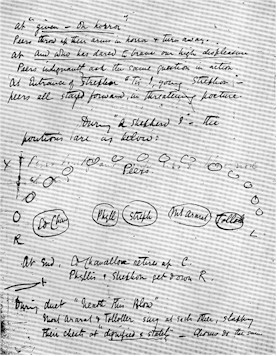|
 When Judi White checks her binder to find out where people stand and how they move, she is following Gilbert’s
own precedent. His prompt books have been preserved in the
D’Oyly Carte archives. The script is on the right hand side, with a
blank page to the left, on which Gilbert scribbled down his notes.
Pictured here is a page from Iolanthe corresponding to the section
in Act 1 where Phyllis tells the Lords she is already in love with
someone else. Gilbert was not only a gifted writer, but a meticulous
director as well.
When Judi White checks her binder to find out where people stand and how they move, she is following Gilbert’s
own precedent. His prompt books have been preserved in the
D’Oyly Carte archives. The script is on the right hand side, with a
blank page to the left, on which Gilbert scribbled down his notes.
Pictured here is a page from Iolanthe corresponding to the section
in Act 1 where Phyllis tells the Lords she is already in love with
someone else. Gilbert was not only a gifted writer, but a meticulous
director as well.
In writing the operettas, Gilbert and Sullivan often worked by
post, with Gilbert sending off new lyrics and dialogue to wherever
Sullivan was in the world at the time. On one occasion he is said
to have remarked to his wife as he dispatched such a package: I
wonder what it will be worth to us? Fivepence postage, or five
figures in the bank?” During preparation of Iolanthe, however, the
two did happen to arrange for a summer meeting at the Half Moon
Inn in Exeter. Sullivan was attending a house party in Cornwall
and Gilbert was yachting off the Devon coast at the time. During
our Society tour of England in 1990, we stopped at Exeter, to find,
from the librarians, that the inn no longer exists; they did, however,
point us to its former location.
In addition to some Act One difficulties, the two may have discussed business concerns. These could have
included Gilbert’s complaint that expenses were too high at the new theatre, compared to those at the old Opera
Comique. If he was counting on Sullivan’s support, he was to be disappointed, not for the last time. Sullivan
usually sided with D’Oyly Carte or simply refused to get involved in mundane business matters. This attitude
would eventually led to the famous quarrel over a carpet replacement during the run of The Gondoliers, and the
virtual end of the team’s amicable relationship.
Cast members were always impressed at first rehearsals, when Gilbert took all the parts and read them appropriately
and impressively. He would then listen in when Sullivan introduced new songs to the cast and mentally note how
he would like to stage them. Sullivan’s inherent laziness and procrastination often meant very short time lines for
completing this staging. “When Britain Really Ruled the Waves” was one of five songs Sullivan completed in one
night when deadlines loomed.
The name change from Perola to Iolanthe may have been an effort to foil theatrical pirates who would copy the
words and music and stage their own versions of the show, with no royalties for the writers. However, it may also
have been an effort to hide the true title from Henry Irving, who had written a one-act play titled Iolanthe two
years earlier. So who were the real pirates? Gilbert was apparently also worried about running afoul of the Censor
by portraying with realistic costuming the sacred orders of the Garter, Thistle, Bath, etc. among the Peers. He did
insist that his men’s chorus be entirely moustache-free, a not-insignificant request. All but one complied. As the
comedian George Grossmith tells it, “The moustache stayed on, but he did not!” On opening night, apparently, the
others were rewarded by having members of the Grenadier Guards band onstage to accompany their entrance.
The show was another hit. It ran for over a year: 398 performances in its initial run. In December, 1882,
Chappell’s worked until midnight to print up and ship out 10,000 copies of the vocal score - the test in those days
of music’s place on the charts!
Sullivan himself celebrated two special occasions in May of 1883. On his 41st birthday, invited guests including
the Prince of Wales (later Edward VII) passed around a new-fangled telephone shortly after 11:00 pm to listen in
as cast members, still at the theatre, sang excerpts from Iolanthe. Sullivan had arranged it all at his own expense.
Nine days later, on May 22, he travelled to Windsor Castle to be knighted by Queen Victoria. This honour was a
mixed blessing. It reminded the composer that Sir Arthur Sullivan ought to be composing more weighty efforts
than his nonensical collaborations with Gilbert. And it reminded Gilbert, who was not to be knighted until 1907,
that it was not Sullivan’s music but his words that skewered British politicians!
|



 When Judi White checks her binder to find out where people stand and how they move, she is following Gilbert’s
own precedent. His prompt books have been preserved in the
D’Oyly Carte archives. The script is on the right hand side, with a
blank page to the left, on which Gilbert scribbled down his notes.
Pictured here is a page from Iolanthe corresponding to the section
in Act 1 where Phyllis tells the Lords she is already in love with
someone else. Gilbert was not only a gifted writer, but a meticulous
director as well.
When Judi White checks her binder to find out where people stand and how they move, she is following Gilbert’s
own precedent. His prompt books have been preserved in the
D’Oyly Carte archives. The script is on the right hand side, with a
blank page to the left, on which Gilbert scribbled down his notes.
Pictured here is a page from Iolanthe corresponding to the section
in Act 1 where Phyllis tells the Lords she is already in love with
someone else. Gilbert was not only a gifted writer, but a meticulous
director as well.